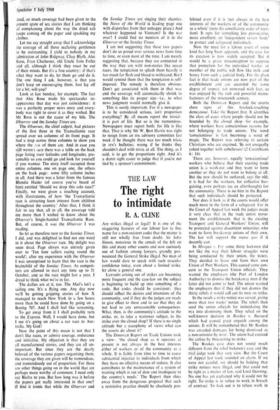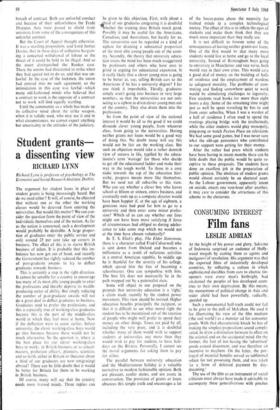The right to intimidate
THE LAW R. A. CLINE
Are strikes illegal or legal? It is one of the staggering features of our labour law (a fine name for a non-existent code) that the matter is still not wholly free from doubt. Sir John Simon, notorious in the annals of the left on this and many other counts and now curiously out of fashion among lawyers, grandly pro- nounced the General Strike illegal. No man of law would dare to speak with such oracular confidence today, even about a limited strike, let alone a general one.
Lawsuits arising out of strikes are becoming more frequent and the case-law on the subject is beginning to build up into something of a code. But codes should be consistent: they should reflect the desires and intentions of the community, and if they do the judges are ready to give effect to these and to see that they do not lead to any unreasonable consequences. What, then, is the community's attitude to the strike, or, to take a narrower subject, to the strike over the closed shop? If there is no single attitude but a cacophony of views what can the courts do about it?
The Donovan Report on Trade Unions took a view : 'the closed shop as it operates at present is not always in the best interests either of workers or of the community as a whole. It is liable from time to time to cause substantial injustice to individuals from which they have no effective means of redress. It also contributes to the maintenance of a system of training which is out of date and inadequate to the country's needs.' The Report then shies away from the dangerous proposal that such a restrictive practice should be absolutely pro- hibited even if it is 'not always in the best interests of the Workers or of the community as a whole' (note the conciliatory order of men- tion). It opts for something less provocative, more emollient, an 'independent review body' to protect and safeguard individuals.
Now the need for a labour court of some kind has long been apparent, and the case for its creation is now widely accepted. But it would be a grave misconception to suppose that protection for the individual worker or member of the public will flow like milk and honey from such a judicial body. For the plain fact is that trade unions are now part of the establishment and are accorded the same degree of respect, not unmoved with fear, as was enjoyed by the rich and powerful manu- facturers of the nineteenth century.
Both the Donovan Report and the courts show signs of this forelock-touching demeanour. Take the Report first. It identifies the class of Cases where people should not be hounded by the closed shop—for example, where workers have conscientious reasons for not belonging to trade unions. The word 'conscientious' is fast becoming a word of magic. The Report was referring to certain Christians who are enjoined, 'Be not unequally yoked together with unbelievers' (2 Corinthians 6: 14).
There are, however, equally 'conscientious' workers who believe that their existing trade union is a wash-out and they want to form another or they do not want to belong at all. But the new should be outlawed, says the old; it is bad for the workers, for collective bar- gaining, even perhaps (as an afterthought) for the community. There is no hint in the Report that such individuals should be protected.
Nor does it look as if the courts would offer much more in the form of a safeguard. For in the Court of Appeal last week the judges made it very clear that in the trade union move- ment the establishment, that is the existing Transport and General Workers' Union, will be protected against dissentient minorities who want to form breakaway unions of their own. The law will support the status quo if it decently can.
In Morgan v. Fry some thirty lockmen did not like the way their labour struggles were being conducted by their union, the TGWU. They decided to leave and form their own Union of Port Workers. This caused some con- cern to the Transport Union bfficials. They wanted the employers (the Port of London Authority) to dismiss the breakaway men if the latter did not come to heel. The union warned the employers that if they did not dismiss the thirty rebels it would call out its men on strike.
In the result a strike notice was served, giving more than two weeks' notice. The rebels then sued the union officials for intimidating the PLA into dismissing them. They relied on the well-known decision in Rookes v. Barnard which had caused great anguish among the unions. It will be remembered that Mr Rookes was awarded damages for being dismissed as a non-unionist by Pont-. The union had coerced the airline by threatening to strike.
The Rookes case does not sound much different from the rebel lockmen's case and the trial judge took that very view. But the Court of Appeal last week sounded an alarm. If we were not careful, we should be holding that strike notices were illegal, and that could not be right as a matter of law, said Lord Denning. No one has yet explained why it could not be right. To strike is to refuse to work in breach of contract. To lock out is to refuse work in breach of contract. Both are unlawful conduct and because of their unlawfulness the Trade Disputes Acts were passed to shield trade unionists from some of the consequences of this unlawful conduct.
But the Court of Appeal thought otherwise. It was a startling proposition, said Lord Justice Davies, that in these days of collective bargain- ing a concerted withdrawal of labour or the threat of it could be held to be illegal. And so the court distinguished the Rookes case. There the unions had threatened to strike when they had agreed not to do so, and that was un- lawful. In the case of the lockmen, the union had entered into no such agreement, so the intimidation in this case was lawful—which many old-fashioned minds who believed that a contract to work is the opposite of a contract not to work will find equally startling.
Until the community as a whole has made up its collective mind about the strike weapon, when it is validly used, who may use it and in what circumstances, we cannot expect anything but uncertainty in the attitudes of the judiciary.











































 Previous page
Previous page